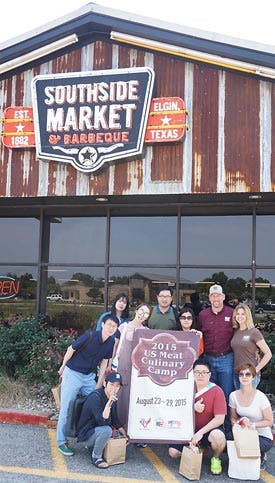U.S. Meat Culinary Camp Educates Korean Chefs on American Barbecue

Chefs and foodservice professionals from Korea focus on meat preparation methods at the 2015 U.S. Meat Culinary Camp
To capitalize on growing interest in Asian countries, USMEF-Korea organized its 2015 U.S. Meat Culinary Camp with a focus on American barbecue. Seminars were held in the Texas cities of San Antonio and Austin and included chefs, foodservice professionals and food processing companies from South Korea. Funding support was provided by the Beef Checkoff Program, the Pork Checkoff and the USDA Market Access Program (MAP).
U.S. Meat Culinary Camp is an educational program dedicated to providing valuable experiences with U.S. pork and beef. Past camps conducted by USMEF-Korea have featured dry aging, burger specialties and processed meat products.
“Recently, American barbecue is gaining popularity in Korea and American barbecue restaurants are appearing in trendy areas as more and more people are enjoying the dish,” said Jihae Yang, USMEF director in Korea. “This led to our decision to make American barbecue the subject of the 2015 U..S Meat Culinary Camp.”

The Korea team in front of Southside Market
This year’s program included two days at the Culinary Institute of America in San Antonio, where Chef Jay McCarthy provided an overview of American barbecue and Texas-style barbecue, highlighted by a cutting and cooking demonstration, demonstrating cut fabrication and refined cooking techniques. The Korean team then visited popular barbecue restaurants, where management and chefs gave kitchen tours and introduced menu concepts.
“That cutting and cooking demo was very interesting and I recognized right away the differences between Korean and U.S. methods,” said camp participant Mingue Lee, a chef at Seoul’s popular and prestigious Palace Hotel. “Compared to Korea, U.S. chefs focus on meat’s own taste. They have confidence in the quality and flavor of their pork and beef.”
McCarthy discussed U.S. pork and beef utilization, noting that American barbecue is not only a food culture in the U.S., but it also comes with a unique set of cooking methods based on smoke and indirect heat.
Korean foodservice professional participating in the camp appreciated the insight.
“Through this camp, we were able to learn about American barbecue and see a wide variety of processed meat products, especially various bacons and beef sausages, and we were very impressed,” said Changyu Jung of S-Food, a Korean meat processing company that produces a variety of meat products for retail chains. “It will be a great help to develop and improve our products.”
Along with the culinary classes and visits to Texas barbecue restaurants, the Korean team sampled American pork and beef barbecue at various restaurants in Texas and met with working pit masters. Team members also toured retail stores and explored a wide range of barbecue equipment, sauces and products.
“The Korean chefs enjoyed U.S. meat in a variety of ways and they were very impressed with the quality and product line of U.S. pork and beef,” said Yang. “Though it was a short period of time, the camp team learned a lot food culture and food trends.”

The team of chefs and foodservice professionals observe sausage smoking at the 2015 U.S. Culinary Camp
